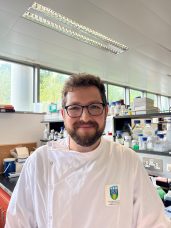Multiparametric analysis of the pancreatic cancer microenvironment in response to neoadjuvant therapy

Dr Aidan O’Dowling
About 600 people in Ireland will be diagnosed with pancreatic cancer this year. Based on current practice, less than 1-in-10 of these will survive 5 years beyond diagnosis. While outcomes for most cancers are improving, this is not the case for pancreatic cancer. It is predicted to become the second leading cause of cancer death by 2030.
A unique characteristic of pancreatic cancer is the dense tissue, called stroma, that forms around the tumour. The stroma in pancreatic cancer is more extensive and physically stiffer than that of any other tumour. This stiffness encourages cancer growth and spread, and also acts as a barrier to prevent drugs reaching cancer cells, which contributes to treatment resistance.
Surgery is the only potential cure for pancreatic cancer. As the symptoms of pancreatic cancer are non-specific, patients are typically diagnosed with advanced cancer and only 1-in-5 patients present with tumours which are suitable for surgery. To increase the number of patients who can access surgical treatment, chemotherapy can be provided with the aim of shrinking the tumour. This is called neoadjuvant therapy.
This research study aims to (i) characterise the tissue response to neoadjuvant therapy and (ii) develop lab-based tumour models using patient tissue which can predict the observed drug responses.
Biopsy and surgically resected tissue will be collected from consenting patients who undergo these procedures as part of their normal treatment. In addition to routine diagnostic analysis, we will assess tissue composition, structure, and stiffness. Cells from the obtained tissue will be used to test response to several different drug treatments. We will compare our laboratory results to patient Computed Tomography (CT) scans.
This study will help us better understand how the tumour responds to drug treatment and provide a foundation for personalised approaches to chemotherapy use and survival.
Back








 Contact
Contact